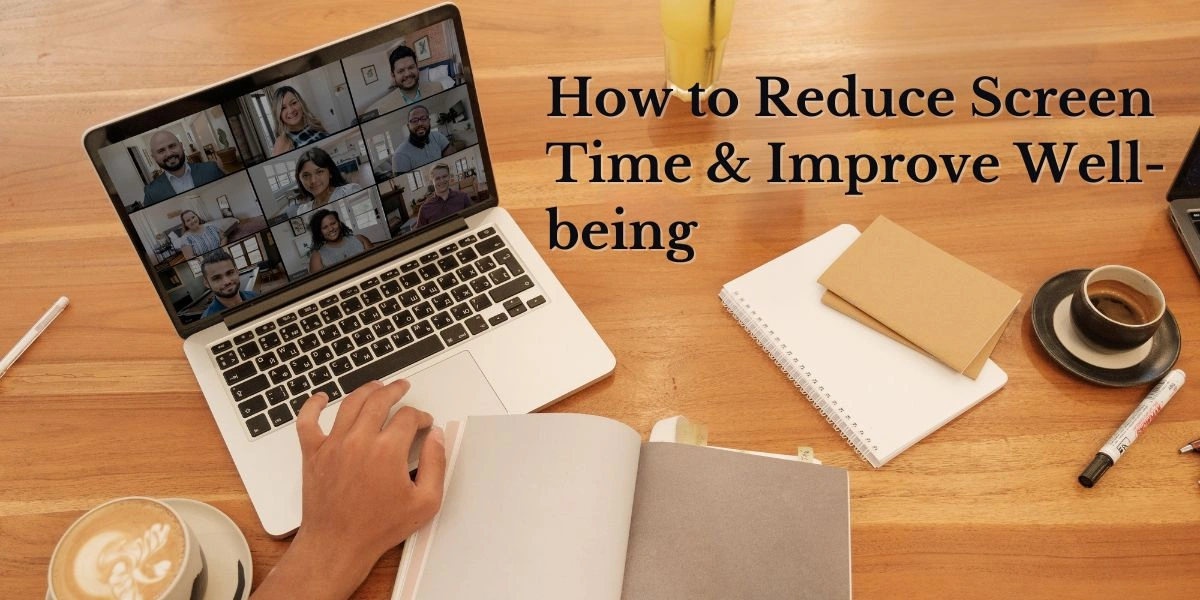In today’s digital age, screens are all around us—whether it’s smartphones, tablets, televisions, or computers, they’ve become deeply embedded in our daily routines. While these devices bring convenience and connection, too much screen exposure can gradually affect our health. Let’s understand how excessive screen time impacts our well-being and explore easy ways to reduce screen time—for both ourselves and our children.
How Excessive Screen Time Affects Us
Strain on the Eyes
Spending extended hours in front of screens can cause digital eye strain, also known as computer vision syndrome. Common symptoms include dry eyes, blurred vision, headaches, and overall eye fatigue. Typically, we blink about 15 times a minute, but this rate decreases noticeably when we concentrate on screens. This leads to discomfort and dryness. The blue light emitted by devices penetrates deep into the eyes and may damage the retina over time, increasing risks like macular degeneration or cataracts. Children are particularly vulnerable to this exposure.
Tip: Reduce screen time and take frequent breaks to protect your eyes.
Disrupting Your Sleep
Screens interfere with our sleep patterns by suppressing melatonin, the hormone that signals our body to sleep. Using phones or tablets before bedtime keeps the brain alert, delays sleep, and reduces sleep quality. Over time, poor sleep may increase the risk of conditions like diabetes, heart problems, and memory issues.
Tip: Reduce screen time by limiting usage at least 1–2 hours before bed to support natural sleep cycles.
Other Health Impacts
Screen overuse can reduce physical activity, leading to:
- Weight gain and posture issues such as slouched shoulders or “tech neck”
- Mental health challenges like anxiety, stress, or social withdrawal
- Cognitive effects, especially in children, where brain and language development may slow. In adults, it can impact memory and concentration.
Tip: Be intentional with screen use and reduce screen time by integrating physical movement throughout the day.

Protecting Your Eyes During Screen Time
Try these habits to ease screen-related eye stress:
- Use the 20-20-20 rule: Every 20 minutes, rest your eyes by looking at something 20 feet away for 20 seconds.
- Blink Frequently: Blinking helps maintain eye moisture.
- Control Lighting: Avoid reflections by adjusting room lights or blinds, and match screen brightness to ambient light.
- Optimize Screen Settings:
- Brightness & Contrast: Match room lighting and ensure easy readability
- Font Size: Increase text size to prevent squinting
- Blue Light Filters: Use “Night Mode” or “Eye Comfort” settings in the evenings
- Maintain Distance & Posture:
- Sit 20–26 inches away from your screen
- Ensure the top of the monitor is at or just below eye level
- Use a supportive chair and take stretch breaks
These strategies can reduce screen time stress on your eyes.
Sleeping Better in a Screen-Filled World
Here’s how to ensure restful sleep despite screen exposure:
- Establish a Tech Curfew: Power down devices an hour or two before bed
- Enable Blue Light Reduction Features: Activate these settings on phones and laptops
- Remove Screens from the Bedroom: Keep the sleeping space device-free
- Choose Relaxing Content: Avoid action-packed shows or news
- Listen Instead: Use audiobooks or soft music instead of scrolling
Each step helps you reduce screen time before bed and promotes deeper, uninterrupted sleep.
General Screen Use Tips
To build healthier screen habits:
- Watch with Purpose: Focus on content that relaxes or informs
- Move Regularly: Get up and stretch every 30–60 minutes
- Drink Water: Hydration keeps eyes moist
- Clean Screens Regularly: Clear displays reduce visual strain
- Regular Eye Checkups: Let your eye doctor know about your digital habits—they may recommend lenses to help you reduce screen time strain
Practical Ways to Cut Back on Screen Time
Here are simple ways to reduce screen time for yourself and your family:
- Create Screen-Free Zones: Keep devices out of bedrooms and dining areas
- Use Timers: Set alarms for breaks and the 20-20-20 rule
- Turn Off Non-Essential Notifications: Prevent distractions and reduce the urge to check constantly
- Lead by Example: Show children that you also value efforts to reduce screen time
- Explore Alternatives: Replace screen time with books, crafts, outdoor play, or conversations
CONCLUSION
We live in a time where screens are nearly unavoidable—but finding the right balance is key. With awareness and small daily efforts, we can protect our vision, support better sleep, and improve overall well-being. Whether you’re a working adult, a student, or a parent, making mindful choices to reduce screen time is a step toward healthier living.
Start with manageable goals. Swap out one hour of screen time for a walk or a book. The more you practice mindful tech use, the easier it becomes to reduce screen time naturally.
Choose wellness. Choose balance. Reduce screen time. Your eyes, body, and mind will thank you.





